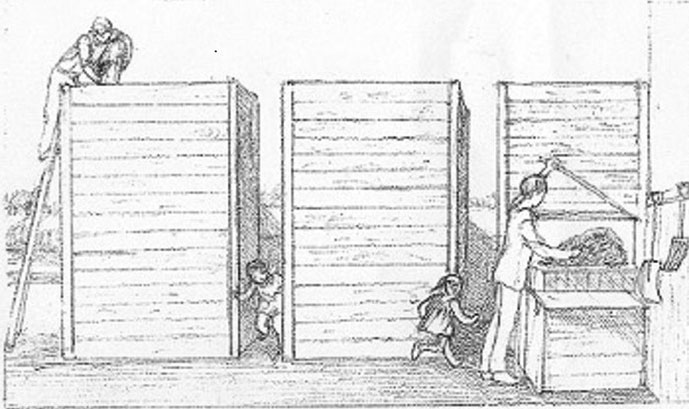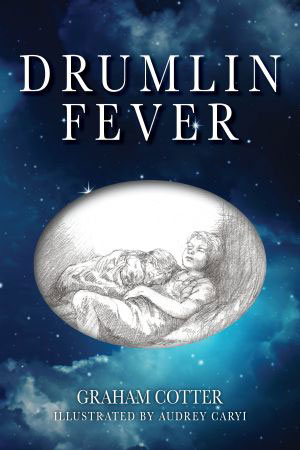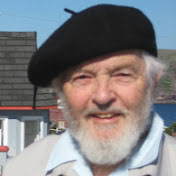Drumlin Fever
by Graham Cotter
Compost Cart

Illustration by Audrey Caryi
On the south side of the hill, the two boys were walking down the sloping road which led to the fields at the foot of their father’s property. They had been despatched to spend the afternoon with Bartholomew Cart, and went across country instead of following the roundabout road.
“That guy sure made Dad go hairy,” said Brian, “I couldn’t figure it very well.”
“He was rude to Mummy, and Daddy can’t take that.”
Brian thought about that. Mummy’d been a bit rude to the Own Your Own Ontario man, but it was safer not to criticize her with Kevin. In any case, neither boy thought that being rude was the worst thing in the world.
“I wonder what that Bumworthy is really after,” said Kevin.
“Our land.”
“And everybody else’s around here”
The boys walked on in silence, Kevin in the lead, swinging at tall grasses and weeds to chop off their heads with a stick he had picked up. Brian followed, looking mostly at the ground through his big glasses, apparently noticing all the little hoppers and insects which scattered in their way.
At the foot of the hill the farm road petered out, and they walked along the rail fence the length of one field due south, and then turned west along a stone fence. They loved to teeter from boulder to boulder, grabbing at branches of trunks of trees which grew along the fence, and escaping the remains of an old barbed wire line which had run along the top of the stones. It was now down most of the way, tangled with vines, and more dangerous for being out of sight.
But the boys had been this way many times, and knew all the danger spots.
The stone fence led further down the hill gradually, and came to the end of a little stream, called the Salt Creek on the maps. Here they could cross quite easily on logs; further back the way they had come, and downstream they would have had to get through the wet marshy land. Once across, they began to climb again as the log cabin of the Cart family was just in sight at the top of a long knoll. The knoll was pasture, with some of George Wiseman’s cows grazing upon it; then a rail fence, of the zigzag or snake variety, and then the grounds of “Cartagena” (pronounced “Cartahena,” as Professor Cart always insisted).
Originally, someone had built a farm house here, on top of a gravel mound, with no water close by. Whatever had become of the farm, the house and buildings were tumbling down when the Professor and his family bought it as a country retreat several years before. He had pulled down the log barn and faced the old house with logs. At the back of the house, where there were two or three acres of gravelly hillside, rising slightly higher than the house, he had planted poplars, now fifteen feet high, but with thick enough growth for constant games for the children. And, as the Professor would say, with thick enough roots to hold the water. For where there had been gravel and erosion there was now a good covering of topsoil, and Mrs. Cart was able to grow a great collection of flowers and vegetables in the space between the trees and the house.
As the boys approached, they could see the Professor and his son working away at the south side of the garden. Here the Carts had an elaborate system of compost piles and heaps. Before they had moved permanently up from Toronto they had brought all their `wet’ (vegetable and kitchen) garbage in bags, and all the leaves they could gather every fall in their neighbourhood, and piled these in boxes six feet square and six feet high, with wide spaces between the slats at the side.
Now there were rows of these boxes, with enough space between t0 move comfortably through and little ladders for climbing up to dump refuse at the top. On one side of the row was another row of piles of various things: one of leaves, one of manure, one of topsoil, one of sand, and a closed box of bone meal. From these and from a big power shredder at one end the various compost boxes were fed at the top, in layers. Then on the other side of the row of boxes were low boxes with wire mesh on top. Through this the compost from the bottom of each pile was shifted; the pieces too big to go through were put back on top of the compost, metal and glass. Into the shredder and on to the compost went every description of waste, except plastics, rubber, metal and glass.
“Hi, Bart,” called out Kevin, “What you doin?”
“Hi Kevin,” replied Bart, turning towards them,
“Shovelling sh – shavings for Daddy.” He grinned.
“Shavings?” said the Professor, “you aren’t anywhere near the shavings pile.
That’s good old horse manure, brought all the way from the dude ranch at Roseneath.”
The Professor looked proudly at the clotted mass of manure.
“And I bet they can still smell it in Roseneath.” Murmured Brian
“I suppose you’d better play with your little friends,” said the Professor”Come on, little friends,” said Bart, “Catch me if you’ve got it in you.”
And he ran off towards the trees, leaping high in the air ever few paces with arms outstretched and a dramatic grin. He had a flat face with a small nose and a big expressive mouth; his hair was long in front, in a cowlick well down over his eyebrows. At the back – well, he was the first boy of public school age in Warkworth to wear his hair in a ponytail. This had led to some teasing, but he was accustomed to that, and so far no one had dared pull the queue (as his father called it). Bartholomew Cart was athletic and tough, and caught a lift once a week to Peterborough to attend judo classes.
He stopped at the edge of the woods and turned on his friends, standing in a posture of oriental defense, which owed more to pictures in magazines than to his judo classes.
“Hai! Chop! Assah!”
He gestured and twisted, moving from one combative stance to another.
“I’m the greatest! I’m rich, famous and wealthy, and eat Crunchy Lunch!”
The two brothers closed in on him and there followed a ritual wrestle. Kevin, who was bigger than Bart, grabbed him in a bear hug around the chest, while Bart struggled and shouted out his assortment of three letter combat noises and four letter obscenities. Brian’s part was to grab his legs. Finally they had him down, and all three relaxed, Bart sitting up in the middle saying…
“You guys are my slaves, forced to your knees because of my mighty power!
“What’s the news of the world of men, slaves?”
Kevin and Brian dutifully reported their news of Mr. Bondsworthy’s futile visit to the Scace’s.
Then Brian added, “Hey, Bart!”
“Yeah.”
“You know all that sand down the road allowance towards Norham?”
“Yeah.”
“Mr. Wiseman says the sand used to be a lakeshore and that our hill is called a whaleback.”
“So.”
“So we could have a game of Whale or a game of Lakeshore.”
“Kids games. Yeah. Tell you what, Dad knows about that lake thing. Let’s go ask him.”
They wandered over to where Professor Cart was filling a barrow with compost.
“Dad.”
“Yes, Tolly.”
The Carts, aware that `Bart Cart’ might be a nickname used for their son named Bartholomew, had taken the second syllable of his name for their diminutive. He was very proud of it at home, but none of his friends called him that, preferring the rhymed name – and the various other rhymes they could easily find for a popular and ribald character.
“Dad, Brian’s been talking to Mr. Wiseman about all this sand and gravel around here. Mr. Wiseman says it’s from some kind of lake. You told me something about that once, didn’t you?”
The Professor put down his shovel.
“Yes. This is one of the most interesting places in Ontario. There was a lake here, covering this hill, and it was part of Lake Ontario, or rather, of a much larger lake covering where Ontario is now, called Lake Iroquois.”
Kevin interrupted, “Were there Iroquois Indians then?”
“No, long before the Iroquois Indians. It had no name when it was here, because there wasn’t anybody here to name it. At least we don’t think so. Geologists named it Lake Iroquois.”
“Where did it go?”
“Well, Scace’s Hill was the cliff above it, and all this highland to the north here, right back to Burnley. Cramahe Hill stood out like an island. If you could have seen land to the east, it would have been the hills on the other side of the Trent at Percy Boom. But most of the time the east shore of the lake was the glacier itself, as it retreated north-east.”
“Retreated?”
Bart had a habit of pretending not to know what things meant in order to keep the conversation going.
“Yes, Tolly. It was the retreat of the glacier which created the land here as we know it. As North America grew warmer, the glacier began to melt; the melting formed drumlins and eskers and moraines – and formed Iroquois Lake.”
“Mr. Cart, what are drumlins and all that?” Brian put in.
“Scace’s Hill is a drumlin. It also happens to have been on the edge of the bluff overlooking the lake. But the drumlins are all over this area, which geologists call the Peterborough Drumlin Field. They are long low hills gently rising, and tend to all point in one direction.”
“Mr. Wiseman says they’re called whalebacks.”
“Yes, they have several names. Geologists use the name “drumlin” which is an old word for a little ridge.”
“Dad,” said Bart, “Why do they all point in the same direction?”
“Because the direction was that in which the glacier was moving. As it moved it created these pockets of gravel and boulders and soil underneath it.”
“Like laying eggs?”
Bart jumped up, popping his eyes, and sticking out his tongue and waving his hands above his head.
“Yes, ‘ chuckled the Professor, “Just like a great cold monster laying drumlin eggs as it moved.”
“Eggs the shape of mousedirt, but not the size of mousedirt,” reflected Brian, who always wondered why different creatures had such distinctive droppings.
Kevin swiped at his brother, mildly embarrassed in front of the Professor.
“Brian, get your mind out of the sewer.”
“Never mind,” said the Professor, “Nothing wrong with the sewer. Just a matter of what you do with it. Brian has a mind of a systems analyst. He sees the glacier as a system. It feeds on snow and winter. As it moves its waste is water on the one hand, and earth formations on the other.”
The professor was quite carried away by the thought of it, and glanced at Scace’s Hill and then down his own gravelly hill where he had made such good use of waste. He was so enraptured at the wonder of nature’s processes that he didn’t hear his son, who grabbed Kevin by the neck and in a loud whisper (Bart didn’t have any ‘quiet’ anything) said,
“The glacier peed the lake and poohed the hills!”
Bart was so enraptured by the imagery at his elementary level that he too went off, like his father, into a kind of ecstasy and cartwheeled across the garden, ending up head first in a pile of hay and manure.
Brian’s usual solemn face broke into hoots of laughter, not only at Bart’s language, but at his mishap. He rushed over to dance a jig, in imitation of his friend, in front of the compost from which the young clown, now half grinning and half cursing, was getting up, shaking his head, spitting, and holding his nose, all at once.
They did not notice the look of shock on Kevin, who suddenly felt sick, and sorry, and ashamed.
Drumlin Fever is now Available for Sale
Great News! Drumlin Fever has now been published. (Sept 2020)

The cost is $20 + $8 shipping and handling if delivered within Canada.

